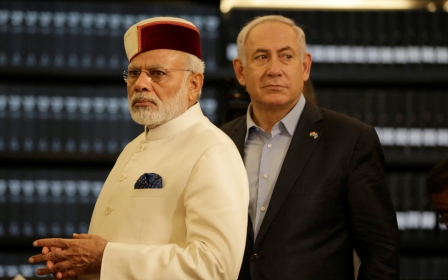Israeli opposition head Isaac Herzog loses Labor Party leadership

Israeli opposition leader Isaac Herzog lost his bid for re-election to head the centre-left Labor Party on Tuesday and the position will be filled by one of two other candidates who will contest a runoff next week.
Herzog was knocked out of a leadership primary election that saw veteran politician Amir Peretz and former environment minister Avi Gabbay proceed to a head-to-head second round set for 10 July.
Peretz, 65, who served as chairman of the Histadrut labor union, defence minister and previously as Labor chairman from 2005-2007, took 33 percent of the vote.
Gabbay, 50, won 27 percent of the vote.
Gabbay quit his post as minister in the government of Benjamin Netanyahu in May 2016 in protest at the appointment of archconservative hardliner Avigdor Lieberman to head the defence ministry.
He also quit the centre-right Kulanu party to join Labor.
Labor merged with a smaller faction headed by Tzipi Livni, a former foreign minister, to form the Zionist Union, which holds 24 seats in the 120-seat parliament. But as the main opposition party, it has held little sway in confronting Prime Minister Benjamin Netanyahu's right-wing government.
While around 31,000 party members voted in the primary, neither Peretz or Gabbay took the 40 percent of votes necessary to win outright.
Labor began as an incarnation of the Mapai party that controlled Israeli politics following the state's inception in 1948 to the 1977 rise of right-wing Likud.
It has seen its influence drop significantly in the past 25 years, during which it saw no fewer than 10 different leaders.
The country's last Labor prime minister was Ehud Barak from 1999 to 2001.
Israeli politics has seen a shift rightward in recent years, with Prime Minister Benjamin Netanyahu and his Likud party in power since 2009.
Recent opinion polls have predicted that with Herzog at the helm, the Zionist Union would fare far worse than in 2015 elections. The next general election is due to take place in 2019.
Middle East Eye propose une couverture et une analyse indépendantes et incomparables du Moyen-Orient, de l’Afrique du Nord et d’autres régions du monde. Pour en savoir plus sur la reprise de ce contenu et les frais qui s’appliquent, veuillez remplir ce formulaire [en anglais]. Pour en savoir plus sur MEE, cliquez ici [en anglais].




